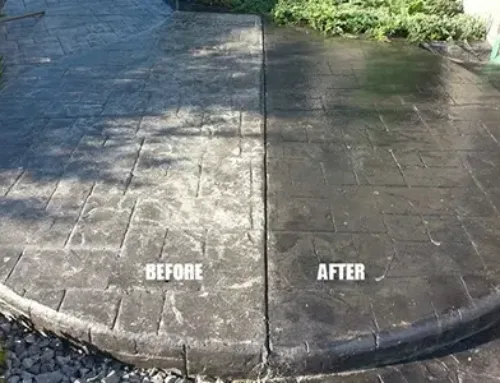**8 Minute Read Time**
Which is Better Concrete or Pavers for Patio?
Apples vs oranges? Red vs Blue? Cappuccino vs frappuccino? Concrete vs paver patio? Ohh the choices… When it comes to most daily decisions, our choices don’t really make a world-changing difference. However, our home is our world when we invite over friends, family, and loved ones. At first thought, it may seem like a walkway or backyard area would be fine built with concrete or pavers. There can’t be that much of a difference, right? Well, the real details may surprise you…
Here are pictures of both a concrete and patio paver brand new:


In contrast, here are the materials in similar elements and backyards after years go by:


You see the difference, but what is really going on here?
Is it Cheaper to Lay Concrete or Pavers?
Obviously, pavers will wear and lose color, but there are sealing and preventive techniques to prevent this. Concrete is usually cheaper, and as you can see-you get what you pay for (a cracked slab). Let’s pull back the curtain a bit, and discover the real value of pavers, and why the cost is worth the investment. What people often don’t realize is that the pavers under consideration are most likely concrete pavers. So, what’s the difference between concrete pavers and poured concrete, if they basically have the same name?
Do Pavers Last Longer Than Concrete?
Because pavers are individually manufactured, they are built with a much higher PSI than poured concrete. Basically, this means the pavers are going to last longer, hold their color more vibrantly, and look better over the course of the decades you plan to enjoy your home landscape. Like those pictures you saw above, time and planning is what really gives pavers the superior edge. It is worth noting though, some pavers can be low quality, and we want to make sure you have some education on how to choose a quality paver so you aren’t overpaying for a lesser product.
As noted and hinted at throughout the blog so far, pavers are typically more expensive (on the front end) than poured concrete. This is because the individual units are more expensive per square foot, and the labor to install them is tedious in comparison to pouring a large slab of concrete all at once. However, pavers provide individual joints all throughout your patio. This, in turn allows your patio to flex as the ground freezes or thaws thus preventing the inevitable cracks of typical poured concrete. So although more expensive on the front end, a properly maintained paver patio will last longer-essentially making it a preferable and cheaper investment throughout your lifetime.
Do Pavers Have Longer Lasting Colors than Concrete?
Pavers are individually manufactured pieces of concrete that come in various sizes and colors. This gives you the ability to do some really unique patterns and designs while creatively blending the various colors of your home. Although you can have poured concrete colored, most often that color is inconsistent throughout the slab due to the mix ratio. You may not get quite what you were expecting, and this is especially dangerous if there are going to be multiple batches of concrete within the same project. You would very likely see the two different pours and varieties.
Pavers, on the other hand, have a much more consistent color blend. We always recommend samples to hold up against your home to assure they are the right choice. During the consultation process, we cover, in more detail, some of our design elements and strategies to choose the right paver colors and designs for your home.
Do Pavers Increase Home Value?
We have established that concrete is the lesser cost (on the front end) when compared to individual concrete pavers. You know the saying is true though: you get what you pay for, cheap stuff isn’t good, and good stuff isn’t cheap! Again, when thinking about the long term value of your property and home, a paver patio or structure will add significant value to a home.

What will happen to the value of your home as concrete wears out over the years? Well, it’s safe to say it’s not a good value. Also, since many backyard areas will be walked on and enjoyed by people (often not wearing shoes, especially in a pool scenario) some homeowners ask: “Are pavers hotter than concrete?” No, no they are not. Because of spacing between pavers, heat is more easily allowed a release–yet another great reason to choose pavers!
See the example of a Unilock manufactured facemix paver, the one of the best on the market.
So, in summary…
Concrete vs Paver Patio Comparison
So which is better, concrete or pavers for patio? Pavers are more durable, less prone to cracking and can even be individually replaced if needed. This makes the cost much lower over the course of time simply because they will outlast a poured concrete slab–by a longshot. A quality paver from a trusted manufacturer is created with a much higher PSI making the paver more durable than typical poured concrete. This is again, essentially why you tend to see cracks, color-fading, and crumbling on a poured concrete pad vs a paver patio.
Additionally, many pavers are now created using a “face-mix” technology that allows the paver to hold its vibrant color for a far greater amount of time. Facemix pavers are manufactured using a two-step process that combines a strong foundation of coarse aggregates with a surface layer of fine, hardwearing minerals. The hardy surface layer prevents the larger, lighter aggregates from showing through due to environmental or mechanical wear and ensures concentrated color and wear-resistance.
Interested to know more about how we can help you build your dream paver patio?
From Start to Finish, We Get the Job Done!
From the original consultation all the way to the finished project, we truly don’t miss a beat! That is why we strive to be the best. We are very proud to be an industry leader. We think you should just go straight to the sources and check our Reviews on Google, that way you can decide who is really the best around! Click here to schedule your professional consultation!





